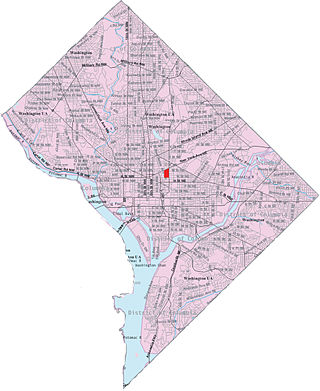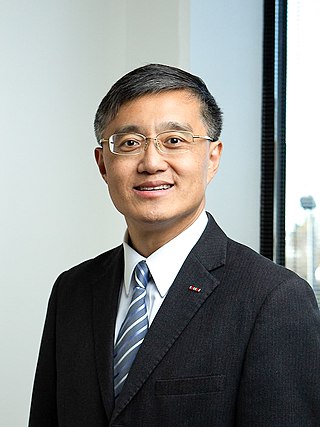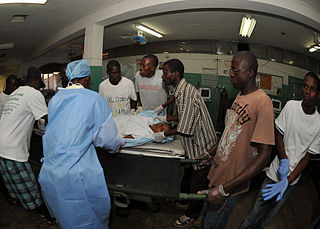
The Georgetown University Law Center is the law school of Georgetown University, a private research university in Washington, D.C., United States. It was established in 1870 and is the largest law school in the United States by enrollment and the most applied to, receiving more full-time applications than any other law school in the country.

Sursum Corda is a small neighborhood located in Washington, D.C., bounded by North Capitol Street on the east, K Street NW to the south, New Jersey Avenue NW to the west, and New York Avenue NW to the north.
Same-sex marriage has been legal in the District of Columbia since March 3, 2010. On December 18, 2009, Mayor Adrian Fenty signed a bill passed by the D.C. Council on December 15 legalizing same-sex marriage. Following the signing, the measure entered a mandatory congressional review of 30 work days. Marriage licenses became available on March 3, and marriages began on March 9, 2010. The District of Columbia became the first jurisdiction in the United States below the Mason–Dixon line to allow same-sex couples to marry.

Out of 10,000 female individuals 13 are homeless. Although studies reflect that there are many differences among women suffering homelessness and there is no universal experience, the average homeless woman is 35 years old, has children, is a member of a minority community, and has experienced homelessness more than once in their lifetime.

So Others Might Eat (SOME) is a nonprofit organization that provides services to assist those dealing with poverty and homelessness in Washington, D.C. The organization provides affordable housing, job training, counseling and other healthcare services, and daily needs such as food and clothing to the poor and homeless. It spends the largest portion of its annual budget on affordable housing, with a majority of its residents recovering from addiction. SOME describes its mission as helping "our vulnerable neighbors in Washington, DC, break the cycle of homelessness through our comprehensive and transformative services".

Bellevue is a residential neighborhood in far Southeast and Southwest in Washington, D.C., United States. It is bounded by South Capitol Street, one block of Atlantic Street SE, and 1st Streets SE and SW to the north and east; Joliet Street SW and Oxon Run Parkway to the south; Martin Luther King Jr. Avenue SE, Shepherd Parkway, 2nd Street SW, and Xenia Street SW to the west. Bellevue was created from some of the earliest land patents in Maryland, and draws its name from a 1795 mansion built in the area. Subdivisions began in the 1870s, but extensive residential building did not occur until the early 1940s. Bellevue is adjacent to a number of federal and city agency buildings.

Woodland is a small residential and industrial neighborhood in Southeast Washington, D.C. Woodland lies in Washington's Ward 8, among the poorest and least developed of the city's wards. Like the neighborhoods around it, Woodland is almost exclusively African American. Woodland is bounded by Ainger Place SE to the north; Alabama Avenue SE and Knox Place SE to the east; Hartford Street SE to the south; and Langston Place SE, Raynolds Place SE, and Erie Street SE to the southwest. Fort Stanton Park forms the northwest and northern border of the neighborhood.

Otto Oswald Lee is a Hong Kong-born American politician, attorney, and military veteran who was a Sunnyvale, California city council member from 2003 to 2011, before which he was on the Planning Commission, which he chaired from 2000 to 2001. From 2005 to 2006 he was vice mayor, and from 2006 to 2007 he was the 57th mayor of Sunnyvale. He is a patent attorney, and a co-founder and partner of the Intellectual Property Law Group LLP.
Endeavors, formerly known as Family Endeavors, is a non-profit organization that provides programs and services towards community, disaster relief, employment, housing, mental health, and veteran family services in the United States.

Whitman-Walker Health (WWH), formerly Whitman-Walker Clinic, is a non-profit community health center in the Washington, D.C. metropolitan area with a special expertise in HIV/AIDS healthcare and LGBT healthcare. Chartered as an affirming health center for the gay and lesbian community in 1978, Whitman-Walker was one of the first responders to the HIV/AIDS epidemic in D.C. and became a leader in HIV/AIDS education, prevention, diagnosis and treatment. In recent years, Whitman-Walker has expanded its services to include primary healthcare services, a stronger focus on queer women's care and youth services.

Deficient sanitation systems, poor nutrition, and inadequate health services have pushed Haiti to the bottom of the World Bank’s rankings of health indicators. According to the United Nations World Food Programme, 80 percent of Haiti’s population lives below the poverty line. In fact, 75% of the Haitian population lives off of $2.50 per day. Consequently, malnutrition is a significant problem. Half the population can be categorized as "food insecure," and half of all Haitian children are undersized as a result of malnutrition. Less than half the population has access to clean drinking water, a rate that compares poorly even with other less-developed nations. Haiti's healthy life expectancy at birth is 63 years. The World Health Organization (WHO) estimates that only 43 percent of the target population receives the recommended immunizations.
Town Hall Education Arts Recreation Campus (THEARC) is a combined cultural and social services campus in Southeast Washington, D.C. The campus consists of three connected buildings, playgrounds, basketball courts and public spaces. In May 2007, THEARC won the Urban Land Institute's Award for Excellence and was cited for its contribution to the community, response to societal needs, innovation, public/private partnership and environmental protection and enhancement.

Bread for the City is a comprehensive front line agency serving the poor of Washington, D.C., USA. The agency began as two organizations: Zacchaeus Free Clinic, and Bread for the City, a project by a coalition of downtown DC churches created in 1974 to feed and clothe the poor. As of 2011 Bread for the City offered food, clothing, social services, legal representation and medical care without charge to eligible DC residents.
Gardens for Health International (GHI) is an American-based 501(c)(3) non-profit organization that seeks to provide sustainable agricultural solutions to chronic childhood malnutrition. GHI partners with rural health centers in Rwanda to equip families with the seeds, skills, and support necessary to shift the paradigm of food aid from dependency to prevention and self-sufficiency.

In the Philippines, the Kapampangan Development Foundation (KDF) is an organization of Kapampangans living outside the region. It was founded in 1987 by 35 people who were inspired by President Corazon Aquino; in 2012, 11 of its founders remained. The KDF has created a rural-industrialization program known as RICH and has provided social and health services to poor residents of Pampanga through its HELP program, with assistance from international and non-governmental organizations and government agencies.

The San Francisco Bay Area comprises nine northern California counties and contains four of the ten most expensive counties in the United States. Strong economic growth has created hundreds of thousands of new jobs, but coupled with severe restrictions on building new housing units, it has resulted in an extreme housing shortage which has driven rents to extremely high levels. The Sacramento Bee notes that large cities like San Francisco and Los Angeles both attribute their recent increases in homeless people to the housing shortage, with the result that homelessness in California overall has increased by 15% from 2015 to 2017. In September 2019, the Council of Economic Advisers released a report in which they stated that deregulation of the housing markets would reduce homelessness in some of the most constrained markets by estimates of 54% in San Francisco, 40 percent in Los Angeles, and 38 percent in San Diego, because rents would fall by 55 percent, 41 percent, and 39 percent respectively. In San Francisco, a minimum wage worker would have to work approximately 4.7 full-time jobs to be able to spend less than 30% of their income on renting a two-bedroom apartment.

Healthcare in Rwanda was historically of poor quality, but in recent decades has seen great improvement. Rwanda operates a universal health care system, and is considered to have one of the highest-quality health systems in Africa.

Pillar of Fire is an illuminated glass sculpture in Washington, D.C. honoring Whitman-Walker Health and the healthcare workers who assisted people living with HIV/AIDS during the height of the AIDS epidemic. Designed by artist William Cochran, the sculpture is composed of 370 layers of float glass that changes colors throughout the day. It was installed in 2013 in front of the old Whitman-Walker Clinic site at 14th and S Streets NW. The design was inspired by the ancient tale of a pillar of fire that led Israelites in their crossing of the Red Sea and through the desert after they fled Egypt.
Covenant House Toronto is a nonprofit organization that serves, at-risk, homeless and trafficked youth between the ages of 16 and 24. It is based in Toronto, Ontario, Canada and is one of many Covenant House locations based in North America. The Toronto location is the largest agency of its kind in Canada, with 80 per cent of their annual funding coming from donors. The house serves as many as 300 youth a day regardless of their race, religion, sexual orientation, gender identity, or the circumstances that have brought them to their doors. Covenant House also offers services such as education, after-care, counseling, health care, employment assistance, and job training. The organization has also offered their services to more than 95,000 young people since its start in 1982.
The concept of street outreach to individuals that are experiencing homelessness is a classic example of a form of outreach. Those who experience homelessness have a variety of complex issues that incite the need for specific forms of care. As such, street outreach is challenging work. There are multiple governmental and non-governmental agencies that have sought to engage in this work because of the understanding that unhoused people tend to have increased barriers to access traditional services. Street outreach comes in different forms, from people walking around carrying supplies or offering resources, to mobile health clinics with teams of medical volunteers driving around and offering services. Regardless of its form, the essence of street outreach is the desire to meet people where they are at, build deep trust and connections, offer support, and reinforce the human dignity and respect that is deserving of all people. The core elements of effective street outreach include being systematic, coordinated, comprehensive, housing-focused, person-centered, trauma-informed, culturally responsive, as well as emphasizing safety and reducing harm.













